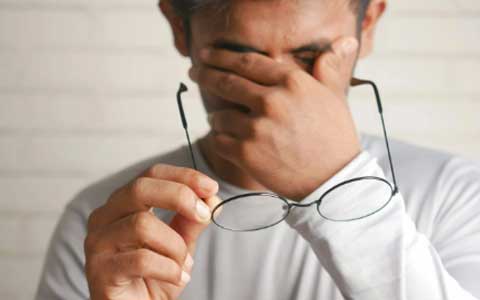
Vision is often taken for granted until subtle changes creep in, like persistent blurriness or difficulty focusing during daily tasks. For many men, these issues might stem not from aging eyes alone but from an underlying hormonal imbalance. Low testosterone vision changes can manifest in unexpected ways, affecting everything from sharpness to light sensitivity. As testosterone levels naturally decline with age or due to lifestyle factors, it influences vascular health, inflammation, and neurological processes critical to eyesight. At HRTDoctor.com, we specialize in testosterone replacement therapy to address these concerns, helping men regain clarity and vitality. If you're noticing hormones affecting eyesight men in your life, exploring TRT could be the key—schedule a consultation today at https://hrtdoctor.com/contact to connect with a TRT doctor nearby.
Research underscores this connection, showing that low testosterone is linked to dry eye syndrome and blurry vision, particularly in older men where androgen levels drop. This hormonal shift can impair the meibomian glands responsible for tear production, leading to discomfort and visual distortions. Understanding these links empowers men to seek proactive care, blending hormone optimization with eye health strategies for comprehensive wellness.
Hormones Affecting Eyesight Men: Testosterone's Crucial Role
Testosterone, the cornerstone of male hormone health, extends its influence far beyond muscle and mood—it's integral to how hormones affect eyesight in men. This hormone supports vascular integrity, ensuring robust blood flow to delicate ocular structures like the retina and optic nerve. When levels dip, reduced circulation can compromise visual acuity, making everyday sights seem hazy or distant. Beyond vessels, testosterone regulates neurotransmitters such as dopamine and acetylcholine, which are vital for processing visual signals in the brain. A deficiency here might slow down how the eyes interpret light and movement, contributing to a less responsive visual system.
Inflammation also plays a pivotal role; low testosterone often correlates with heightened systemic inflammation, irritating ocular tissues and exacerbating conditions like dry eyes or blurred vision. Metabolic disruptions from hormonal imbalance, including insulin resistance, heighten risks for diabetic retinopathy, a leading cause of vision loss in men. Studies reveal that testosterone has a neuroprotective effect on retinal cells, shielding them from damage and supporting overall eye resilience. For instance, fluctuations in sex hormones like testosterone can alter corneal thickness, potentially shifting refractive errors and causing temporary vision impairments. These indirect effects highlight why maintaining balanced hormones is essential for long-term eye health, prompting many to consider testosterone replacement therapy as a supportive measure.

Low Testosterone Vision Changes: Recognizing the Subtle Signs
Spotting low testosterone vision changes early can prevent escalation, yet these symptoms often mimic common ailments like fatigue or screen strain. Blurred vision emerges as a primary indicator, stemming from diminished blood flow to the eyes, where inadequate oxygen and nutrients dull sharpness. Eye fatigue follows closely, as hormonal impacts on energy metabolism leave the ocular muscles weary after minimal use, such as reading or driving. Difficulty focusing, both mentally and visually, arises from neurotransmitter imbalances that slow visual adaptation to near or far objects.
Light sensitivity, or photophobia, can intensify, with glare becoming overwhelming due to inflammation and neurological shifts. Dry eyes round out the list, influenced by testosterone's role in tear production; lower levels disrupt the oily layer of tears, leading to irritation and inconsistent clarity. These changes aren't isolated—they often accompany broader low T symptoms like reduced libido or mood swings. If you're over 40 and noticing these, a hormone check could reveal the root cause, especially since studies link tearing, photophobia, and blurring to altered testosterone concentrations. Addressing them through targeted care at HRTDoctor.com can restore not just vision but overall quality of life.
Symptom | Possible Hormonal Link | Impact on Daily Life |
|---|---|---|
Blurred Vision | Reduced blood flow to eyes | Difficulty reading or driving |
Eye Fatigue | Energy metabolism disruption | Strain during work or hobbies |
Difficulty Focusing | Neurotransmitter imbalance | Challenges in multitasking |
Light Sensitivity | Inflammation changes | Discomfort in bright environments |
Dry Eyes | Altered tear production | Persistent irritation and redness |
Testosterone Cognitive Function Vision: The Brain-Eye Hormone Connection
The interplay between testosterone cognitive function vision is fascinating, as this hormone modulates brain areas crucial for interpreting sights. Low levels can dampen activity in the occipital lobe, responsible for visual stimuli processing, leading to slower recognition of shapes and colors. The parietal lobe, aiding spatial awareness, may suffer too, causing issues with depth perception during activities like sports or navigation. Meanwhile, the prefrontal cortex, governing attention, experiences reduced efficiency, making it harder to maintain visual focus amid distractions.
Brain fog, a hallmark of low T, exacerbates these by slowing visual processing speed, where information takes longer to register. Men might struggle tracking moving objects or endure heightened glare sensitivity. Studies show higher free testosterone correlates with faster visual processing and sustained visuospatial abilities in older men. A single testosterone administration has improved visuospatial skills, highlighting its cognitive boost. This testosterone cognitive function vision link underscores why hormonal balance is vital for mental sharpness and clear sight.
TRT and Eye Health: Benefits, Risks, and How Testosterone Replacement Therapy Can Help
Exploring TRT and eye health reveals both promise and precautions. Testosterone replacement therapy restores bioidentical hormones, potentially enhancing circulation to boost retinal blood flow and alleviate blurriness. It may sharpen mental focus by balancing neurotransmitters, reducing brain fog's visual distortions. Reduced inflammation from TRT could ease dry eyes and sensitivity, while better sleep supports ocular recovery.
However, risks exist; TRT might increase retinal disease chances like central serous chorioretinopathy or vascular occlusions. Blurry vision has been reported as a side effect in some cases. Always monitor with a specialist. At HRTDoctor.com, our tailored testosterone replacement therapy prioritizes safety, integrating eye health considerations for optimal outcomes.

TRT Doctor Nearby: Personalized Care at HRTDoctor.com
Finding a TRT doctor nearby shouldn't be a hassle—HRTDoctor.com offers accessible, expert-led testosterone replacement therapy via telehealth. Our providers crafting plans based on comprehensive labs. Unlike generic approaches, we focus on individual needs, ensuring TRT enhances health without undue risks. Schedule at https://hrtdoctor.com/contact - your TRT doctor nearby awaits.
Lifestyle Tips to Support Eye Health During Testosterone Replacement Therapy
Complementing testosterone replacement therapy with lifestyle adjustments amplifies benefits for eye health. Hydration combats dry eyes, while the 20-20-20 rule—looking 20 feet away every 20 minutes for 20 seconds—eases strain. A diet rich in omega-3s from fish, leafy greens for lutein, and antioxidants like berries supports retinal health. Regular exercise improves circulation and hormone balance, and prioritizing 7-9 hours of sleep aids neurological and ocular repair. These habits, paired with TRT, foster sustained vision improvements.
Final Thoughts: Achieving Clarity with HRTDoctor.com
Low testosterone vision changes can cloud life's moments, but understanding hormones affecting eyesight men opens doors to solutions. At HRTDoctor.com, we're dedicated to your journey—contact us at https://hrtdoctor.com/contact for expert testosterone replacement therapy and see the difference.
